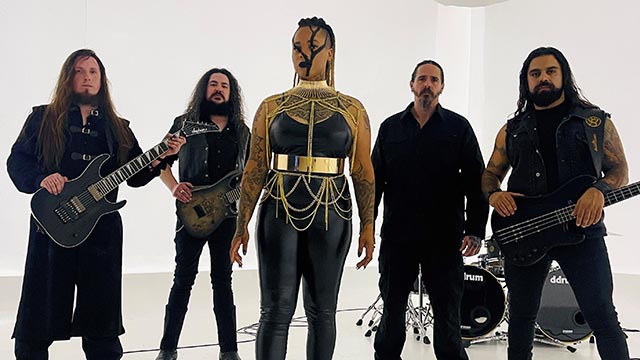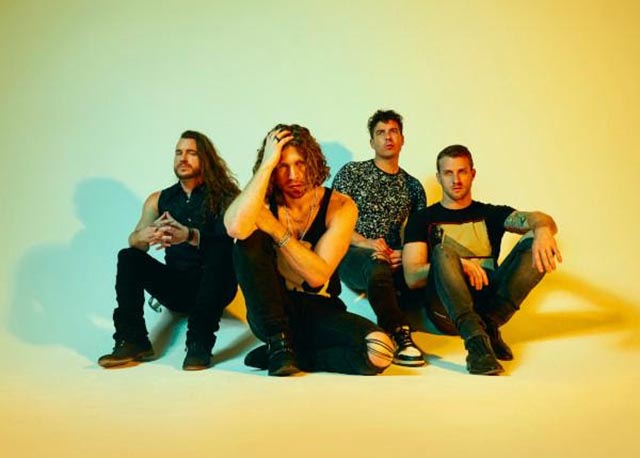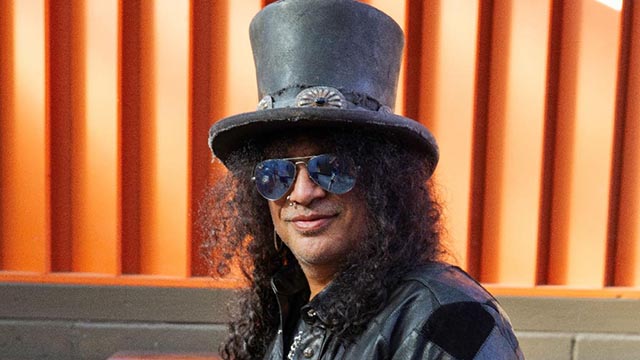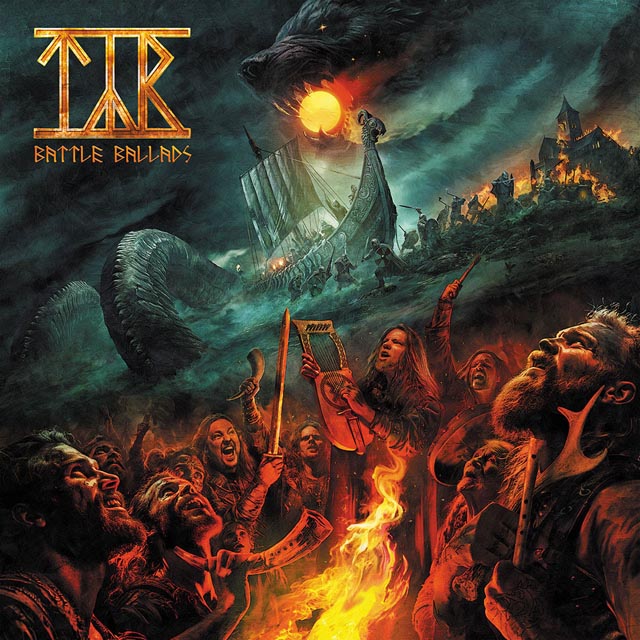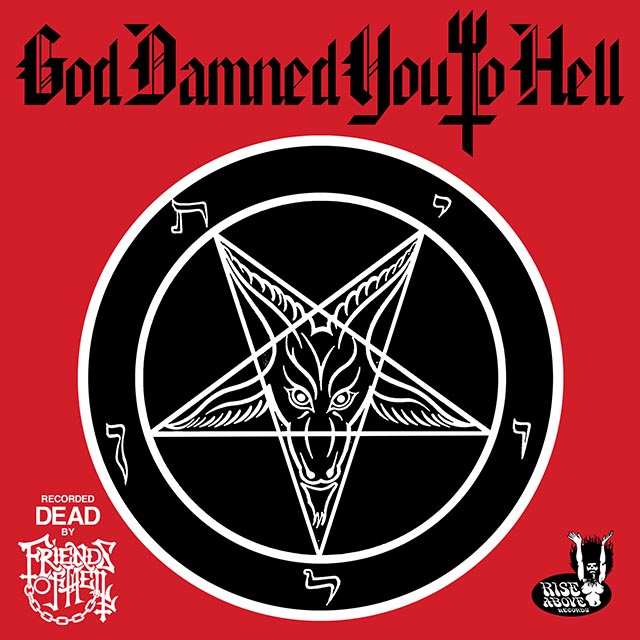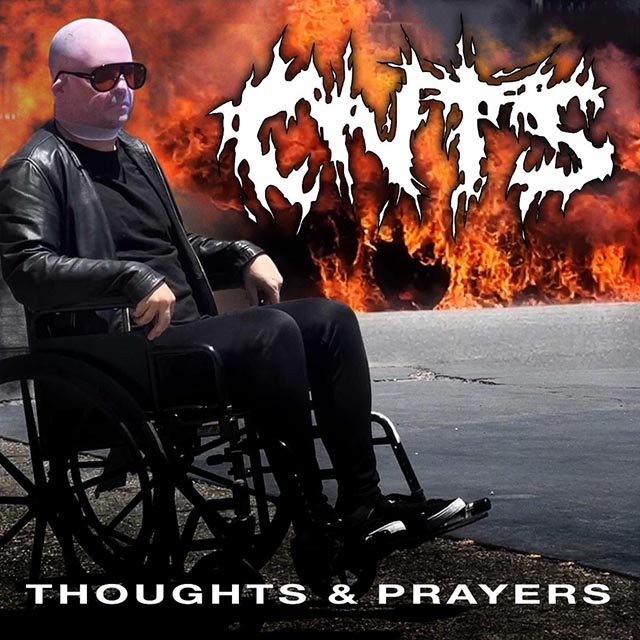 Hearing the names Black Sabbath and Pantera attached to a project is without a doubt a great way to get any metal fan’s attention. So the fact drummer Vinny Appice (Black Sabbath, Dio, Heaven & Hell) and bassist Rex Brown (Pantera, Down), along with singer Dewey Bragg (Pissing Razors) and guitarist Mark Zavon (Ratt, W.A.S.P., 40 Cycle Hum), joined forces in a new group called Kill Devil Hill isn’t something to take lightly. We’ve had the chance to see them live up to expectations onstage last Fall, but fans will get to hear what Kill Devil Hill has to offer in the studio when they release their debut self-titled album on May 22.
Hearing the names Black Sabbath and Pantera attached to a project is without a doubt a great way to get any metal fan’s attention. So the fact drummer Vinny Appice (Black Sabbath, Dio, Heaven & Hell) and bassist Rex Brown (Pantera, Down), along with singer Dewey Bragg (Pissing Razors) and guitarist Mark Zavon (Ratt, W.A.S.P., 40 Cycle Hum), joined forces in a new group called Kill Devil Hill isn’t something to take lightly. We’ve had the chance to see them live up to expectations onstage last Fall, but fans will get to hear what Kill Devil Hill has to offer in the studio when they release their debut self-titled album on May 22.
Rewind a few weeks back, though. We had the chance to speak with Vinny Appice himself. And indeed it was an interesting time to talk with him, considering everything that’s been happening with his former band. During our chat, we asked him the inevitable questions regarding Black Sabbath (including how Tony Iommi has been holding up, as well as about that empty seat behind their drum kit). However, Appice also opened up about the birth of Kill Devil Hill, revealed that he worked with Dave Grohl on a song for his Sound City Studios documentary, and reflected on the special moments he shared with the late Ronnie James Dio.
While Kill Devil Hill’s debut album definitely has a modern edge to it, I also hear a lot of influence from each member’s past bands (especially Black Sabbath and Down). Were you ever afraid, though, that you and Brown’s past fame may overshadow Kill Devil Hill at all?
No, not really. I thought it was plus, coming from such major and heavy bands. These days, it’s hard to do something without some star power in it or whatever you want to do; even concerts, packaging “KISS/ Motley Crue.” People want value for their money. [laughs] That’s not why we did it.
The funny thing is, we didn’t put this together and write those songs to sound like any of those bands. Actually, a lot of the material was started before Rex was involved. It was just the way Mark [Zavon, guitarist] plays, and a lot of my ideas were in there, keeping the riffs heavy but gentle. I like the fact that it’s compared to Sabbath, or Down, or Alice In Chains or whoever. They’re all great bands, but we never sit there and go “Oh, let’s try and sound like this!” It just came out. It’s like a good fart [laughs].
Well it definitely doesn’t smell like one.
[Laughs] There’s a lot of people who have asked that over the years with Dio and Sabbath. They go “Oh, did you want it to sound like this?” You know what, all of those bands never thought of themselves as sounding like anything. It just came out. It’s just a combination of people that are writing the songs and playing them, and develops into a product or a baby almost. All of these different fathers, and then a baby comes out. That’s the way it works.
What do you specifically hope to accomplish with Kill Devil Hill that you may not have done with Sabbath, Dio or other past projects?
Well, growing up as a kid, I always envisioned being in a band, my own band. When I started playing, I had a couple of original bands in Brooklyn when I was like 13 or 14. I actually didn’t think about winding up playing with other people that were established already, and that’s where my career went. I worked a little with John Lennon and Rick Derringer, but Rick was already established. He was selling tickets and albums, but I became part of that band and musically a big part of it. And then Black Sabbath was already established. With or without me they were going to sell out the arenas at that time. But I came in as a solid team player and worked hard to fit in and contribute to that band. And Dio was the same thing.
So I was always involved with bands or people that were established. And I was a part of that, but it wasn’t something that I’m quarter of responsible for, whether you sell a million records or ten records. So I was always my dream have my own band. I tried other projects here and there, putting things together. This [Kill Devil Hill] started a couple of years ago, and it’s just evolved into something really great. This happened better than anything. It wasn’t “Oh, I think we should get Rex Brown, he was from a big band!” It wasn’t that; I wanted to create music.
It started with the guitar player Mark, and we got along good. And we had Jimmy Bain [bassist, Dio/ Rainbow] involved at first. It all evolved on its own. And then Mark me a song of Dewey Bragg the vocalist, and I heard that and went “That’s the guy! I want to hear that!” He was kind of modern and weird/ dark. Then we tried a couple of other bass players when Jimmy didn’t work out, and I happened to hear that Rex was looking for something. And I know Rex, I love the way he plays. So I called him; it all evolved the way a cool band should be. There was any arrangements made or nothing like that. It just came together.
From what I heard off the album so far, I was really impressed at how Kill Devil Hill sounded like a “real” band despite so many different ingredients going into it.
Yeah, this is a real band. I mean, my heart is completely into this. And obviously Dewey and Mark have done some things in their career, but this is the biggest thing they’ve done. They’re diehards. The good thing about Dewey and Mark is that they’re unknown, but they’re real. Mark plays the way he plays, and he doesn’t sell out. He believes in what he plays, it’s in his soul and heart. And Dewey is the same way. When you see Dewey, he looks like he sounds, and he’s real. He’s not just these guys that put the chain on their wallet.
I see so many of those chains going to the wallet. It’s like “Do you have to do that to look cool?” If you’re doing that and it’s expressing yourself or it’s real, then it’s cool. If you’re doing that because it’s what Tommy Lee did, then it’s stupid. I don’t even have a fucking tattoo on me. I don’t go with fads. Actually the funny thing is, with Heaven & Hell, nobody had a tattoo.
That’s actually kind of surprising.
Yeah, during Black Sabbath era with me and Ronnie, nobody had a tattoo. [laughs] We got age spots, but no tattoos. But I don’t go with fads. I never once sold out and played other music. I believe in heavy fucking music and I always played loud. People want a ballad, and it’s like “Fuck that, I don’t do that.” Everybody’s real in this band. And Rex is on 11 all of the time with his bass. He knows what he wants to sound like, he knows what he wants to play, he’s pissed off and that’s fucking it. And it’s the same thing with me. I still got fire in me, I’m still pissed off, I still want to kick the shit out of whoever we play with. I still got that kind of attitude, and so does Dewey and Mark.
Everybody’s real in the band. We were on the road, stuck in a tour bus for a month. There were fights, there was shit that happened on that one month tour that never happened in my whole career with Black Sabbath. Just crazy shit, but it was funny. It’s rock and roll, but nothing that would cause it to break up or anything like that. The next day everyone laughed and we were all cracking up. So it’s a cool rock band. And me and Rex are totally into this. We feel the music is great, we got a lot more in us, and it’s exciting to create new music. And we want this to last, we want to build it up and do another album, or how many more we can do, and make the rest of our careers out of this.
How did Kill Devil Hill come to choose SPV/Steamhammer as their label home?
Well, we had someone shopping deals for us, and we had a couple of different offers. Their offer seemed to be more exciting and more like they were into the band. So we thought “We want people around us that believe in the band.” We think that’s more important than getting more money from somewhere else and getting lost in the shuffle. SPV seemed excited, seemed to really like what we were doing, and we said “Let’s do it!” And that’s like with all the people we try to keep around us. We want people who will believe in it like we do. So they seem to be like that, and it’s worked out good so far. They’re really treating us well, and when we needed things they were there. I think they’ll do a good job with it, and we’re willing to work our ass off doing it. It’s a good combination.
Did you ever consider going the DIY route?
Nah, I don’t want to do that [laughs]. I don’t even have time…I have a desk and a bunch of papers on it. Finally I get through the papers, and two days later there’s another stack of papers, and emails and shot. I don’t have to do anything like that. Plus, I wouldn’t know exactly what to do. So I think the record business is in a crappy state, but they have distribution, promotion, they have some power still. And they can get the album out there, and we can do whatever we can do to make it happen. I just don’t have the time to do it, and I would wind up doing most of it [laughs] and I don’t want to do that. It’s a lot of work.
So a lot has been happening with Black Sabbath these past few months. First off, I was just wondering if you have been in contact with Tony Iommi since his diagnosis was made public, and if you know how he’s holding up at the moment.
I heard he’s doing good. I’m in contact with him here and there. He’s my brother, we’ve known each other for so long. So I wanted him to know I’m there for him and concerned. I’ve had some nice emails back. He’s feeling good, and I think everything is positive. He’s got a positive attitude. So everything is looking pretty good. We all wish him the best, and he’s in our prayers. But from all I hear, everything is cool.
That’s really great to hear. I know we’ve all been very worried since it was made public.
Yeah, and it’s so soon after Ronnie. When you first heard the news about Ronnie, it’s like “Oh my God, I can’t believe it!” And then two years to hear about Tony, this is not fair. So hopefully everything will turn out fine.
You previously admitted that it would be “hard” to turn down the opportunity to play with Sabbath again. I hate to be so direct, but have Sabbath contacted you about possibly filling in for Bill Ward, or at least for the shows they have planned so far?
No, I haven’t heard a peep. And that’s why, even when I’m communicating with Tony, it’s on a friendship level. I never write in “Hey man, what’s happening?! Hey how you feeling? Feeling good? Oh, good! Hey, what’s going on with the band? I’d love to do that!” I never do that. I never did that with Sabbath at all, or with Dio. I’ve always been asked to be in a band. I’m not that kind of guy to hound somebody and say “Hey I could really use the money or the gig!” [laughs]. I never did that…
But nobody’s said anything, and at this point it’s cool. I can understand because we also did four years of Heaven & Hell. If I was in the band, it would be like Ozzy [Osbourne] touring with Heaven & Hell. People could take it possibly as that, even though it’s bigger than that. And then there’s all of these political things involved. But with Sabbath, you can never figure out what’s going on anyway. So at the end of the day, who knows what happens. There might be a call going “Ok, this guy is not working out, would you maybe come back?” That’s what’s happened in the past.
I’d like to see Bill do it. I think Bill being in the band makes it the original band, and how many original bands are left from that era that had such influence? So I’d love to see Bill in there. I love Bill, and I’d love to see the original band. And that’s what the fans want to see obviously.
I hate to press further on this, but if they were to call you asking to join them, what would you say?
That’s a hard one because my heart’s in Kill Devil Hill and I want this band to be successful. And the Sabbath thing, it’s hard to turn down something so legendary, like “Hey, you want to play on the next or last Black Sabbath album?” It’s part of history. So it would be hard to turn down. I would just make it work with both bands coexisting. If I had to do that, I would do it. But maybe it would help Kill Devil Hill. Maybe we’d open the tour, if they were touring? If it was like this is going to take the next three years and you can’t do anything else, then I would have to think about it.
But my main thing is Kill Devil Hill. The Sabbath thing, that would be hard for anybody to turn it down. And I’m not talking about money or anything, I’m just talking about being a part of the history of the band and rock. It would be a great opportunity for anybody. But it’s not even going to happen. They’ve gone this long, they’re obviously playing and writing. I heard that they were in the studio by March. I don’t know who’s doing it. I heard maybe Tommy [Clufetos] from Ozzy’s band doing it.
But I must say this, it was really funny reading all the internet stuff because when Bill came out [with his statement], people were writing in going “Vinny should do it! Vinny’s the next in line!” Then people go “Fuck Vinny! He doesn’t belong up there! Bill should be up there!” Then all of a sudden Tommy’s name came up, they were going “Fuck Tommy! He doesn’t deserve to be up there! Vinny should do it!” It just went down the line. And I was cracking up, like “Damn!” You can’t win or lose.
That’s one of the big downsides of the internet. You just can’t win sometimes.
Nah, you can’t win. Things get out on Blabbermouth, people commenting. People like to rag on people. That’s what happens. There’s some cool people that make sense and write cool things, but then there’s people that just want to vent their anger. You’ve got to read it with a grain of salt. If it’s good, you go “Cool,” and if they tell you [that] you suck, you go “Cool.” [laughs] You can’t let it affect you.
You recently took part in Dave Grohl’s Sound City Studios documentary. Did you actually record anything with Grohl or was it just an interview for the film?
Umm, I don’t know if they would want that out yet… I’m not sure [laughs].
Well I ask because other musicians, like Corey Taylor [Slipknot, Stone Sour] and members of Ratt,, recorded some songs with Grohl.
Ok, yeah I did! Yes I did.
Can I get you to confirm whether or not you recorded a cover of “Mob Rules”?
Oh no, it’s not “Mob Rules.” Why, did they say it was “Mob Rules”?
No, but I know that Grohl is covering “Mob Rules” for the upcoming Dio tribute album.
Well that’s something else. That’s Wendy’s [Dio’s widow/ manager] thing. Dave Grohl’s got something about the history of the Sound City recording board. He bought that. So he owns it now, and it’s in his studio. We [Dio] recorded Holy Diver on there. So Dave got together everybody that recorded on that board and is making a documentary, which is incredible. So there’s going to be some music involved too.
What was it like working with Grohl?
Dave is one of the coolest guys I’ve ever met. I met him a while ago on a Sabbath gig. First time I met him, he was a really big Sabbath fan and I was like “Wow!,” because he was a pretty famous guy himself. And I love Nirvana and all of the Foo Fighters’ stuff, and I totally respected Dave. So we got along really well and he’s a super guy. He’s smart, he’s so creative, he plays fucking guitar, he plays everything! He’s a killer drummer. I went to see him play with Them Crooked Vultures. And then working with Dave was just fantastic. He makes you feel at home. For a guy that on top of the business and so successful, he’s down to earth. He’s a great guy and really cool to work with.
I don’t want to say too much because I don’t know what he has in mind. [laughs]
As you touched upon earlier, you’ve had the chance to work with a broad range of musicians, from Ronnie James Dio to John Lennon. Is there one particular artist that you worked with who really made an impact on you?
It would have to be Ronnie. Ronnie was an incredible person, and I loved that guy. I was fifteen years or so younger than Ronnie, and he was like a father figure to me. He was smart, an extremely bright, sharp person, creative. I watched him a lot. I tried to learn from him. He taught me a lot of things, and he was just really influential in my life. And besides being one of the greatest singers in rock, if not the, he was a cool guy to start at a young age with. He was such a professional, and just seeing him go out onstage and belt it out no matter what happened before or after the show. Whether he’s feeling good or not feeling good, he went out and he just killed it. And the way he treated his fans, he loved his fans, and it was just about the fans and the music. A true die-hard person, and it was amazing to be around something like that.
Do you have a favorite moment that you shared with Ronnie?
There are so many moments. I mean, you could say [how] we started Dio and we were playing theaters, but then about nine months later we were playing the Forum in L.A. and we got gold records presented to us. That was a real highlight. And there were times that we joked around and pulled pranks on people together. He loved that. I was always instigating it, and then go “Ronnie, let’s do this!” and he’d go “Yeah! Let’s do it!”
You could imagine how many airports we were at, how many hotels we were at, how many recording studios, how many performances, how dressing rooms, buses, planes. [laughs] There were so many experiences. It’s hard to remember them all. And then first meeting him on the [Black Sabbath] Heaven & Hell tour, that was all new to me. All eye opening stuff.

